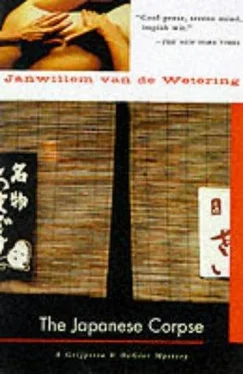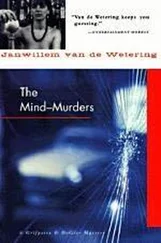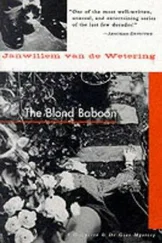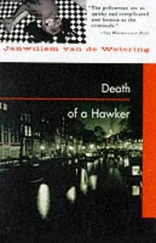Janwillem De Wetering - The Japanese Corpse
Здесь есть возможность читать онлайн «Janwillem De Wetering - The Japanese Corpse» весь текст электронной книги совершенно бесплатно (целиком полную версию без сокращений). В некоторых случаях можно слушать аудио, скачать через торрент в формате fb2 и присутствует краткое содержание. Жанр: Полицейский детектив, на английском языке. Описание произведения, (предисловие) а так же отзывы посетителей доступны на портале библиотеки ЛибКат.
- Название:The Japanese Corpse
- Автор:
- Жанр:
- Год:неизвестен
- ISBN:нет данных
- Рейтинг книги:3 / 5. Голосов: 1
-
Избранное:Добавить в избранное
- Отзывы:
-
Ваша оценка:
- 60
- 1
- 2
- 3
- 4
- 5
The Japanese Corpse: краткое содержание, описание и аннотация
Предлагаем к чтению аннотацию, описание, краткое содержание или предисловие (зависит от того, что написал сам автор книги «The Japanese Corpse»). Если вы не нашли необходимую информацию о книге — напишите в комментариях, мы постараемся отыскать её.
The Japanese Corpse — читать онлайн бесплатно полную книгу (весь текст) целиком
Ниже представлен текст книги, разбитый по страницам. Система сохранения места последней прочитанной страницы, позволяет с удобством читать онлайн бесплатно книгу «The Japanese Corpse», без необходимости каждый раз заново искать на чём Вы остановились. Поставьте закладку, и сможете в любой момент перейти на страницу, на которой закончили чтение.
Интервал:
Закладка:
"An amateur," Grijpstra thought, as he drove the white VW back into the garage. "No professional would have stripped the body. And our two suspects are supposed to be gangsters. Joanne Andrews says so, the Japanese consul says so, I say so. Two fat uttle cool cucumbers living it up in jail. They are absolutely sure they are going to be released. And why are they so sure?" He parked the car and gave the keys to the sergeant.
"Did you have a nice time?" the sergeant asked.
"I found a nice corpse," Grijpstra said. "The worms found it first though. It looked a little strange, pale green, you know, and the eyes…"
"Never mind," the sergeant said, walking away. "I was only being polite. You should have said 'yes, thank you,' that's quite enough. I don't want to know about eyes and worms."
"Well, there weren't any eyes," Grijpstra said, but the sergeant was looking at him from behind a glass door with his fingers in his ears. "Because they never killed poor Mr. Nagai," Grijpstra continued his monologue. "So who did?"
He was breathing deeply as he climbed the stairs which led to the floor where the inspector had his office. Never punch an officer, he was saying to himself. If you get very angry with an officer you can shoot him in the back, when nobody is looking. Now don't get angry with the poor little idiot just because he has a nasty way of talking. All you have to do is report to him and he hasn't any real power over you. The commissaris is your direct chief and you can telephone him tonight, you don't even have to go through the operator, all you have to do is dial a lot of numbers. * A small town just outside Amsterdam.
\\\\\ 13 /////
The Commissaris was watching intently as the priest, with much hissing and bowing, reverently lifted the scroll from its simple wooden box and held it up with both hands. Dorin had knelt down, his hands placed flat on the floormat, and the head with the bristly black crew cut bobbed rapidly up and down. De Gier was sitting farther back, some four feet from the commissaris. He had crossed his legs and was smoking one of the commissaris ' small cigars, but he stubbed it out as he felt the concentrated mood of the room.
The priest, a man in his late thirties, simply dressed in a brown cotton robe, raised his small head, looking even smaller because of the shaved skull. His quiet eyes swept the room, taking in the three men facing him. "Very good painting this," he said, searching painfully for words, "done by great master, Chinese painter, not just painter, very much more than painter, great master, great wisdom."
He paused, vainly attempting to collect more words.
Dorin cleared his throat. "Perhaps you can unroll the painting and our guests can see, then explanations may be unnecessary."
The priest smiled gratefully and raised himself to his feet in one supple movement without taking his hands off the rolled-up scroll. De Gier whistled with admiration. After much practice he had taught his body to change from the sitting to the standing position without pushing it up with his hands, but the movement had always been jerky, consisting of a great many separate muscle actions. With the priest there seemed to be no effort at all. He wondered if the man was taught judo or other sports in the monastery, or whether such suppleness of limbs came naturally to these strange people. The scroll rolled free by its own weight and they saw a drawing in ink, done in a few flowing brush strokes. An old bald-headed man in a tattered robe was resting his head and right shoulder on a large sleeping tiger. The animal lay stretched out, every muscle and sinew and tendon relaxed. The large eyes, shadowed by huge eyebrows, were tightly shut and the paws were flat on the ground, the nails out. The old man's eyes were closed too and the expressions of both faces were absolutely identical.
"Shin K'o," the priest was saying. "Chinese master, tenth century, but this is not the original. Original is in China, kept in museum. This is thirteenth-century copy by Japanese master, unknown." He thought again. "Anonymous, but great master all the same. Very valuable scroll, worth fortune in West."
"Beautiful, beautiful," the commissaris mumbled. The drawing was in perfect balance, man and animal completed each other, but there was more than just harmony and perfect detail, in spite of the seemingly haphazard flow of the lines. The folds and contours of the old man's robe were done with thick strokes that conveyed a great power to the image.
"Painting is called 'Two Patriarchs Harmonizing Their Minds,'" the priest said shyly.
"What is a patriarch?" de Gier asked.
"A master, an old master who has taught many disciples, many monks, many lay people."
"A master?" de Gier asked, shuffling forward on his knees to get closer. "So the tiger is a master too? Like in a fairy tale?"
The priest didn't know the meaning of "fairy tale," and Dorin translated quickly. The priest smiled. "Yes. But this is real fairy tele. Tiger is master, old man is master. Two masters meet. Minds meet. Two minds, one mind."
"Very beautiful," the commissaris said again. "But we don't want to handle this valuable piece; it may get damaged. Perhaps you'd better take it back to your temple and we can pretend you are asking a high price and we are not ready to pay it yet. You are not alone, are you? If the yakusa want it they may take it from you on your way back."
"He is safe," Dorin said. 'The yakusa don't want just this piece; they want everything they can get and they can only get it through the priest. If they start robbing openly, the whole thing comes to the surface, the police will be alerted and public opinion will be roused. They don't want that. Kyoto is the heart of Japan, most of our national treasures can be found here; almost every Japanese will visit the city a few times in his life. Robbing art from here is a heinous crime. It would upset the whole country. The yakusa will have to work in the dark."
"Good. Then maybe we should offer our friend a beer. Would you like some nice cold beer, sir?"
The priest smiled. "Please, last few nights I drink many beers, very nice. Also gamble and meet prostitutes. Very strange occupation for priest. High priests say this is spiritual exercise."
They all laughed. A maid brought the beer and the four men discarded their formal ways. The priest returned the scroll to its box and put it in a corner of the room. After the second glass his words seemed to come more easily. The commissaris asked about Deshima, and the priest started a long discourse on Japan's early contact with the West. As, during the seventeenth and early eighteenth centuries, only Dutchmen were allowed to trade with the country, Japanese curiosity about Western ways had to be satisfied via the tiny island, the size of a large ship. A special science was developed, called Ran'gaku, "Ran" being an abbreviation of Oranda or Holland, "gaku" meaning "study." Japanese scholars managed to master the Dutch written language and read Dutch scholarly works on medicine, astronomy, botany, mathematics and the art of war. Ballistics was of special interest as the Japanese, by then, had grasped the principles of firearms.
"Very useful," the priest said, and giggled, "but our people thought that Holland was large and powerful country, dominating the Western world. Not true. Later, English had to be learned, much more important language. Dutch very interesting no doubt, but only few people spoke it."
"That's still true today," the commissaris said, and nibbled at a cookie. "Very tasty this."
"Seaweed," Dorin said. "It tastes a little like pretzels, doesn't it? But it comes straight from the sea."
"Hmm," the commissaris said, and slipped the cookie into his pocket as he pointed at a pine tree, visible through the open sliding doors which led to the balcony of their room. The inn was similar to the one where they had stayed in Tokyo but larger and more luxurious. It was, the priest told them, a converted temple, as so many buildings in Kyoto are. With the decline of Buddhism and the receding number of monks and priests, and the lessening support, both from state and public, temples had fallen into disrepair, and only during the last ten years or so had interest in the magnificent structures been revived.
Читать дальшеИнтервал:
Закладка:
Похожие книги на «The Japanese Corpse»
Представляем Вашему вниманию похожие книги на «The Japanese Corpse» списком для выбора. Мы отобрали схожую по названию и смыслу литературу в надежде предоставить читателям больше вариантов отыскать новые, интересные, ещё непрочитанные произведения.
Обсуждение, отзывы о книге «The Japanese Corpse» и просто собственные мнения читателей. Оставьте ваши комментарии, напишите, что Вы думаете о произведении, его смысле или главных героях. Укажите что конкретно понравилось, а что нет, и почему Вы так считаете.












